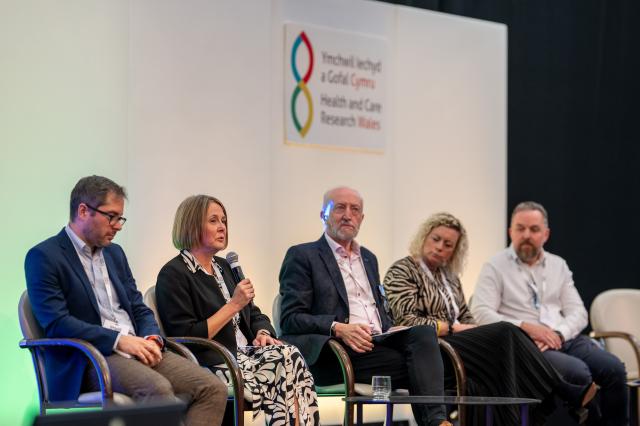
How can collaboration across different sectors drive investment in research and bring greater benefits for patients?
22 October
One of the stand-out lessons from COVID-19 was that we need to collaborate to innovate and work together to deliver.
Building a culture of cross-sector collaboration brings many essential benefits including shared learning, collective expertise, as well as building capacity and capability in research. Forming strong relationships can lead to research outputs that ultimately accelerate public benefits. But progressing partnerships on paper into collaborations that deliver tangible outcomes is a challenge faced by many organisations.
At the Health and Care Research Wales ninth annual conference in October we heard from a panel of senior leaders from the NHS, academia, local government and industry on the role they are playing in fostering meaningful collaborations to help tackle some of our biggest health and social care challenges.
Trust is the glue
Dr Leighton Phillips, Director of Research, Innovation and Value at Hywel Dda University Health Board said identifying a clear and common purpose was essential for effective partnership working. “Everyone will approach collaboration with a slightly different agenda and a balance needs to be found between resources, reward and risk,” he said.
Leighton’s research interests include the biopsychosocial determinants of decision making in complex systems and he has led a substantial programme to better understand the factors influencing technology adoption in healthcare systems, including working with leading biopharmaceutical and medical technology companies.
“Organisations are heavily governed for very good reason, so we often need to overcome constraints within our own organisations and that takes time. Trust is the glue that holds collaborations together … contracts can only take you so far, but good relationships can get you back on track,” he added.
Combining skills and evidence
Rhondda Cynon Taf Council was successful in its bid to become a Health Determinants Research Collaboration (HDRC) following a £5m funding award from the NIHR in 2023. The collaboration, co-led by the Wales Centre for Public Policy, brings together partners from Cardiff University, Cwm Taf Morgannwg Health Board, Interlink RCT and Public Health Wales.
Each HDRC is hosted by a local authority which works with universities or institutions with expertise in the wider determinants of health. This brings together local government knowledge with research skills from the academic community. The aim is to improve the evidence base on which to make policy decisions that impact on health and health inequalities.
Louise Davies, Director of Public Health, Protection and Community Services at RCT Council who leads on the project and spoke on the panel said, “This funding is about creating the culture to allow research to happen. Local authorities are not generally known for being research pro-active but we have real value to add, as well as opportunities for academics to understand a different system and local communities.”
Leveraging our small size
Panellists agreed that the ‘human element’ was the bedrock of any collaboration, and that Wales could use its advantage as a small country to build more meaningful connections to drive change. “Collaboration is what attracted me to Wales,” said Professor William Gray, Director of the Health and Care Research Wales-funded Brain Repair and Intracranial Neurotherapeutics (BRAIN) Unit. And Rachel Savery, Head of the Advanced Therapies Wales programme in Welsh Government added, “you have the agency to be part of change and relationships are the key. I see an important part of my role as providing the grease as well as the glue to help facilitate connections and collaborations!”